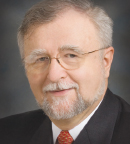
Gonzalo Gomez-Abuin, MD
The invited discussant of the MONALESSA-2 trial was Gonzalo Gomez-Abuin, MD, a medical oncologist who is Head of the Clinical Research Unit at Hospital Alemán in Buenos Aires. According to Dr. Gomez-Abuin, phase III trials of three different CDK4/6 inhibitors—ribociclib, palbociclib, and abemaciclib—have shown progression-free survival benefits in the first-line treatment of postmenopausal breast cancer, with consistent hazard ratios—0.57, 0.57, and 0.54, respectively. The results from MONALEESA-21 are the first overall survival data reported from these studies, and they are “the first to break the 5-year median overall survival barrier” in this population.
Dr. Gomez-Abuin continued: “It is important to note that these overall survival data (hazard ratio [HR] = 0.76) are in line with those from MONALEESA-3 (HR = 0.72),2 -MONALEESA-7 (HR = 0.71),3 MONARCH 2 (HR = 0.76),4 and PALOMA-3 (HR = 0.81).5 We can see a consistent overall survival benefit with CDK4/6 inhibitors across different settings, irrespective of menopausal status, line of therapy, and endocrine sensitivity.”
“An interesting finding is that the overall survival benefit with ribociclib/letrozole increased over time,” Dr. Gomez-Abuin added. “This finding makes us wonder whether the overall survival difference between the arms will remain the same or will even be amplified with longer follow-up, and what percentage of patients will remain free of disease progression at this point,” he commented. “We’ll have to wait for the answer to these questions.”
Differences in De Novo and Non–De Novo Subgroups
Although all subgroups appeared to benefit from ribociclib/letrozole, the hazard ratio of 0.91 for patients with non–de novo disease is “intriguing,” as it differs from that of 0.60 previously reported for progression-free survival, noted Dr. Gomez-Abuin. “According to the progression-free survival analysis, these two subgroups—de novo and non–de novo—have the same intrinsic sensitivity to ribociclib/letrozole, but how can we explain the apparent lack of benefit in overall survival for the non–de novo subgroup? We need more data, but it will be interesting to know whether overall survival is different according to different levels of endocrine sensitivity,” he said.
During the discussion period, Gabriel N. Hortobagyi, MD, MACP, FASCO, weighed in on this issue with a note of caution: “This is an important question, but I caution us not to make too much about the forest plot. With a couple of exceptions, the subsets were not part of stratification criteria, and therefore there is no guarantee the comparisons we see are real.”

Gabriel N. Hortobagyi, MD, MACP, FASCO
Although there are hypotheses regarding the differences in overall survival vs progression-free survival benefits for the de novo and non–de novo populations, Dr. Hortobagyi does not discount the simple possibility that this is a statistical fluke. “We are in the process of analyzing this observation in greater depth…. In the meantime, we should take the overall survival results of the entire population as the lead answer and not follow the subset analysis until further information is obtained,” Dr. Hortobagyi suggested.
What Next?
Dr. Gomez-Abuin concluded that the MONALEESA-2 data strongly support the use of CDK4/6 inhibitors in the front-line setting, and the next question is the optimal sequence of these effective agents. The ongoing SONIA trial is evaluating treatment with an aromatase inhibitor plus CDK4/6 inhibitor (physician’s choice) followed by fulvestrant in the second line vs an aromatase inhibitor followed by fulvestrant plus CDK4/6 inhibitor in the second line. This trial of more than 1,000 patients may offer some hints as to the optimal sequence of these agents.
DISCLOSURE: Dr. Gomez-Abuin disclosed relationships with Merck Sharp & Dohme, Novartis, Pfizer, AstraZeneca, Eli Lilly, Roche, Amgen, Bristol Myers Squibb, and Jansen. Dr. Hortobagyi has received research funding and personal fees from Novartis for the MONALEESA trials.
REFERENCES
1. Hortobagyi GN, Stemmer SM, Burris III HA, et al: Overall survival results from the phase III MONALEESA-2 trial of postmenopausal patients with hormone receptor–positive/human epidermal growth factor receptor 2–negative advanced breast cancer treated with endocrine therapy ± ribociclib. ESMO Congress 2021. Abstract LBA17_PR. Presented September 19, 2021.
2. Slamon DJ, Neven P, Chia S, et al: Overall survival with ribociclib plus fulvestrant in advanced breast cancer. N Engl J Med 382:514-524, 2020.
3. Im SA, Lu YS, Bardia A, et al: Overall survival with ribociclib plus endocrine therapy in breast cancer. N Engl J Med 381:307-316, 2019.
4. Sledge Jr GW, Toi M, Neven P, et al: The effect of abemaciclib plus fulvestrant on overall survival in hormone receptor–positive, ERBB2-negative breast cancer that progressed on endocrine therapy—MONARCH 2: A randomized clinical trial. JAMA Oncol 6:116-124, 2020.
5. Turner NC, Slamon DJ, Ro J, et al: Overall survival with palbociclib and fulvestrant in advanced breast cancer. N Engl J Med 379:1926-1936, 2018.

